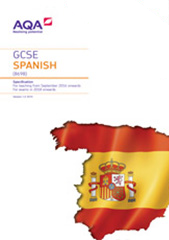3.2 Scope of study
Listening: understand and respond to spoken language
Students are expected to be able to:
- demonstrate general and specific understanding of different types of spoken language
- follow and understand clear standard speech using familiar language across a range of specified contexts
- identify the overall message, key points, details and opinions in a variety of short and longer spoken passages, involving some more complex language, recognising the relationship between past, present and future events
- deduce meaning from a variety of short and longer spoken texts, involving some complex language and more abstract material, including short narratives and authentic material addressing a wide range of contemporary and cultural themes
- recognise and respond to key information, important themes and ideas in more extended spoken text, including authentic sources, adapted and abridged, as appropriate, by being able to answer questions, extract information, evaluate and draw conclusions.
Speaking: communicate and interact in speech
Students are expected to be able to:
- communicate and interact effectively in speech for a variety of purposes across a range of specified contexts
- take part in a short conversation, asking and answering questions, and exchanging opinions
- convey information and narrate events coherently and confidently, using and adapting language for new purposes
- speak spontaneously, responding to unexpected questions, points of view or situations, sustaining communication by using rephrasing or repair strategies, as appropriate
- initiate and develop conversations and discussion, producing extended sequences of speech
- make appropriate and accurate use of a variety of vocabulary and grammatical structures, including some more complex forms, with reference to past, present and future events
- make creative and more complex use of the language, as appropriate, to express and justify their own thoughts and points of view
- use accurate pronunciation and intonation to be understood by a native speaker.
Reading: understand and respond to written language
Students are expected to be able to:
- understand and respond to different types of written language
- understand general and specific details within texts using high frequency familiar language across a range of contexts
- identify the overall message, key points, details and opinions in a variety of short and longer written passages, involving some more complex language, recognising the relationship between past, present and future events
- deduce meaning from a variety of short and longer written texts from a range of specified contexts, including authentic sources involving some complex language and unfamiliar material, as well as short narratives and authentic material addressing a wide range of relevant contemporary and cultural themes
- recognise and respond to key information, important themes and ideas in more extended written text and authentic sources, including some extracts from relevant abridged or adapted literary texts
- demonstrate understanding by being able to scan for particular information, organise and present relevant details, draw inferences in context and recognise implicit meaning where appropriate
- translate a short passage from Spanish into English.
Writing: communicate in writing
Students are expected to be able to:
- communicate effectively in writing for a variety of purposes across a range of specified contexts
- write short texts, using simple sentences and familiar language accurately to convey meaning and exchange information
- produce clear and coherent text of extended length to present facts and express ideas and opinions appropriately for different purposes and in different settings
- make accurate use of a variety of vocabulary and grammatical structures, including some more complex forms, to describe and narrate with reference to past, present and future events
- manipulate the language, using and adapting a variety of structures and vocabulary with increasing accuracy and fluency for new purposes, including using appropriate style and register
- make independent, creative and more complex use of the language, as appropriate, to note down key points, express and justify individual thoughts and points of view, in order to interest, inform or convince
- translate sentences and short texts from English into Spanish to convey key messages accurately and to apply grammatical knowledge of language and structures in context.
